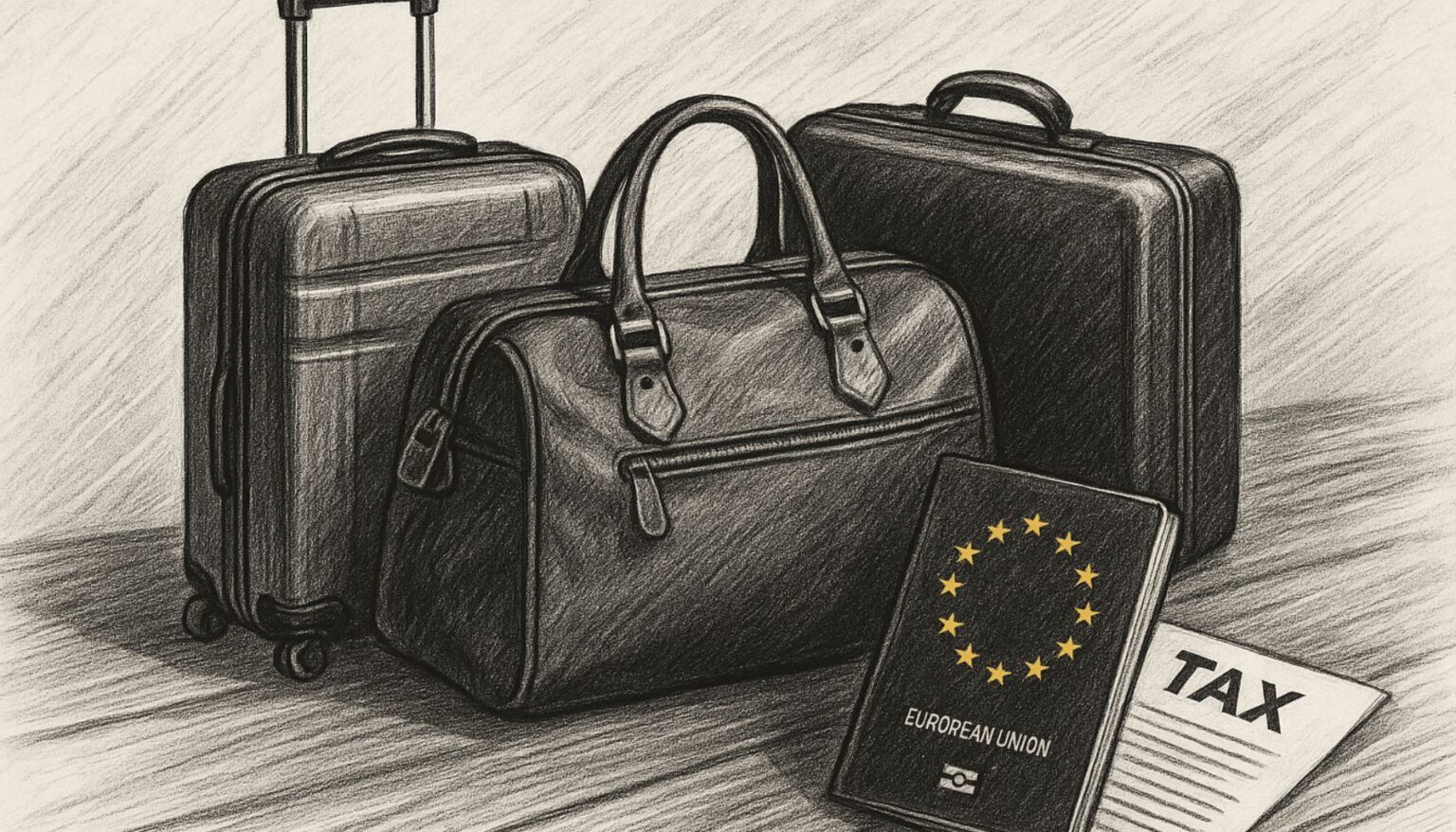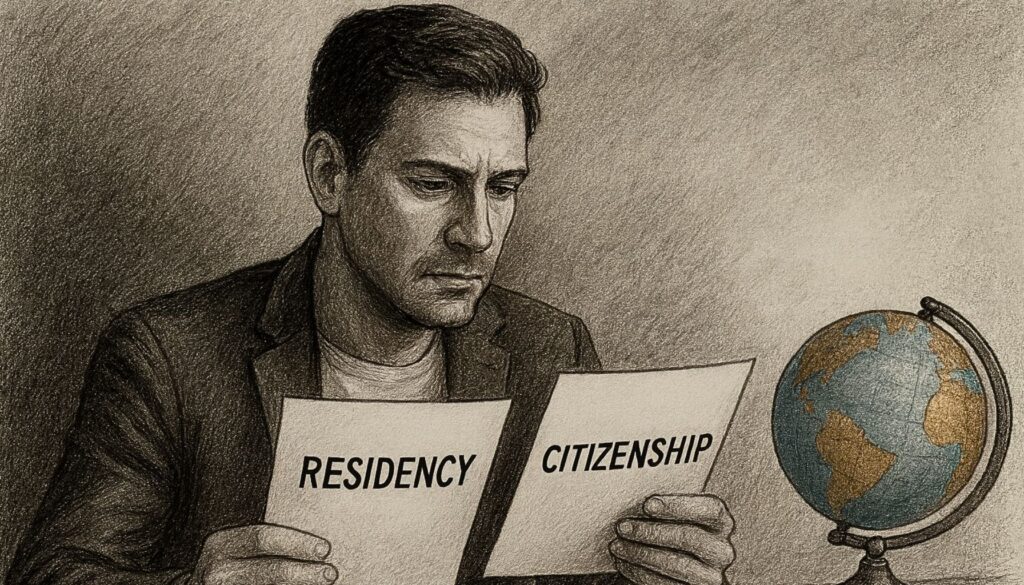Tax exile is not a trend: it’s a survival strategy.
In 2025, Europe has stopped competing. The United Kingdom dismantled the Non-Dom regime, a status that, for 225 years, attracted capital and talent triggering more than 10,800 millionaires to pack up and leave. One every 45 minutes.
This exodus is just one of the visible consequences of tax exile in Europe, where governments chase away those who once sustained the system.
Europe needs productive capital to fill the void left by its own stagnation. But instead of fostering innovation or economic growth, it prefers to turn high-performing taxpayers into cash cows, squeezing them dry to cover for the state’s lack of productivity.
Millionaires, entrepreneurs, startup founders, and mobile professionals are fleeing the continent not on a whim, but with intention. The message is clear: if you produce, you’re squeezed; if you accumulate, you’re watched; if you leave, you’re punished.
That’s why planning your tax exile in 2025 is no longer just a financial decision. It’s a strategic move. Because even if you manage to achieve the loss of tax residency, many European countries will still try to tax you as if you never left.
Those who already made the move didn’t act blindly. They followed the best tax exile strategies in 2025:
• They chose jurisdictions with clear rules
• They combined legal residency with intelligent structures
• They protected their assets from the exploitation model
• They sought expert advice from Nomad Tax
Nomad, there’s a big difference between moving impulsively and having a solid plan. It’s not enough to simply look for countries with lower tax pressure in Europe.
In this blog, you’ll get a clearer view of the consequences of tax exile in Europe, the most strategic destinations, and a checklist of tax exile before relocating, designed to help you make decisions with clarity, structure, and long-term vision.

International strategy
Indice del artículo
Tax Exile in 2025: More Than a Trend, a Necessity
Consequences of tax exile in Europe
Over the past two years, Europe has lost tens of thousands of high-value taxpayers. We’re talking about capital managers, hedge funds, startup founders, and tech companies. People who, when they leave, take with them the structures that once sustained Europe’s economic ecosystem because they are no longer willing to fund a model that punishes productivity and rewards dependence… and bureaucracy.
France, with a tax pressure of 45.4%, is openly debating 90% inheritance taxes.
Germany has normalized income tax rates above 50%.
These levels are simply not sustainable in the absence of real returns in infrastructure, economic freedom, or regulatory stability.
In Denmark and Belgium, tax pressure is around 45%.
In Spain, for example, workers face over 40% in taxes, while business owners watch more than 55% of their income disappear between corporate taxes, dividends, and social contributions and that’s without including VAT or indirect taxes.
All under the narrative of “fiscal solidarity.”
The result?
A continent where per capita income has lost more than 40% of its purchasing power compared to the U.S. since the year 2000.
In 2008, Europe’s per capita GDP stood at 78% of the U.S. level.
By 2024, it had dropped to 67%.
While the U.S. and China continue to attract capital, talent, and innovation, Europe is pushing producers away, regulating them out, and subsidizing stagnation.
The consequences of tax exile in Europe are clear: shuttered offices, a collapse in foreign direct investment, and an exodus of digital and financial talent.
Meanwhile, receiving countries like Cyprus, the Emirates, or Paraguay aren’t just absorbing wealth they’re capturing innovation, vision, and productive structures that contribute without suffocating.
The New Institutional Narrative: Productivity Under Suspicion
The European Fiscal Board made it clear in its 2025 report:
Public spending remains at excessive levels, with no correlation to the economic performance of Member States.
Still, the political response is to increase taxation and narrow the fiscal breathing room for those who already contribute the most.
In this environment, the loss of tax residency is no longer seen as a legitimate planning tool it’s viewed as a threat to the dominant narrative.
That’s why many European countries continue to pursue taxation even after taxpayers have left legally.
Why Doesn’t Capital Stay to Compete in Europe Anymore?
Because it’s no longer wanted as a partner it’s wanted as a cash cow.
Rather than encouraging capital to stay, Europe has chosen to enforce policies that drive it away, all while nurturing a rhetoric that equates mobility with betrayal.
Even the European Commission admitted in 2025 that a more coordinated and fair tax system is urgently needed. Its latest initiative, DCA 9, aims to strengthen tax cooperation among Member States and enforce a global minimum tax on large corporations.
But in practice, this doesn’t solve the problem it makes it worse.
Because it adds layers of surveillance, automatic reporting, and bureaucratic hurdles to those who already operate legally.
Capital isn’t fleeing because it wants to hide. It’s leaving because it wants to grow.
And it’s moving toward countries with lower tax pressure in Europe and beyond, where prosperity doesn’t require a confession.

How to Plan Your Tax Exile in 2025 Without Mistakes
The loss of tax residency: legal traps no one talks about
In 2025, the loss of tax residency has become a far more scrutinized and complicated process.
Tax authorities across several countries have tightened their control mechanisms to prevent tax avoidance via changes of residency. In Spain, for example, the tax agency has introduced stricter protocols to verify whether a taxpayer has genuinely left demanding solid proof of physical relocation and full disconnection from the country.
It’s crucial to understand that the loss of tax residency isn’t just about no longer paying taxes in your country of origin. It also requires meeting the legal criteria of your new host country.
This includes days of physical presence, economic and personal ties, and obtaining official tax residency certificates issued by the relevant authorities.
Checklist of tax exile before relocating: what no one tells you
Before you make the decision to change your tax residency, make sure you’ve considered the following:
- Evaluate the tax legislation of your destination country
Investigate local tax laws, including income tax, wealth tax, inheritance, and capital gains. - Residency requirements
Make sure you fulfill the legal criteria to be considered a tax resident in your new country such as minimum days of stay or the existence of economic and personal ties. - Tax residency certificates
Obtain official documentation that confirms your new tax residency. This is essential to avoid double taxation and comply with international obligations. - Review double tax treaties
Check whether a tax treaty exists between your origin country and your new one. These treaties help avoid dual taxation and ensure your new tax residency is recognized. - Wealth and succession planning
Consider how changing your tax residency will affect your assets and inheritance strategy, and make the necessary legal and financial adjustments to optimize your position.
Is it legal to stop paying taxes in your home country? Here’s what the law says
Yes, it is legal to stop paying taxes in your country of origin as long as you meet the legal conditions for changing your tax residency.
This means proving that you’ve transferred your economic and personal center of interests to another country and that you comply with the legal criteria set by both the origin and destination tax authorities.
However, some countries impose specific regulations to deter taxpayer flight such as the exit tax, which targets unrealized capital gains at the time of departure.
That’s why it’s strongly recommended to get guidance from international tax experts before making the move.

Countries with Lower Tax Pressure in Europe: Strategic Destinations in 2025
Cyprus: The Strategic Fiscal Refuge in Europe
Non-Dom Regime: 17 Years of Fiscal Freedom
Cyprus offers one of the most attractive non-dom regimes in Europe.
New tax residents can enjoy full exemptions on dividends, interest, and passive income for up to 17 years. Additionally, contributions to the national health system (GESY) are capped just 2.65% on dividends, with an annual ceiling of €4,770.
Tax Residency in Just 60 Days
Cyprus provides one of the most accessible paths to tax residency in Europe.
Under the 60-day rule, it’s possible to establish tax residency without spending more than 183 days per year in the country provided you meet certain criteria, such as not being a tax resident elsewhere and maintaining a permanent home in Cyprus.
Competitive Corporate Tax Rate
Although Cyprus has announced an increase in the corporate tax rate from 12.5% to 15% to align with OECD guidelines, it remains one of the most competitive rates in Europe.
Additional Exemptions and Benefits
- No inheritance or gift taxes
Cyprus does not tax inheritances or gifts, which makes it an ideal jurisdiction for estate and succession planning. - Exemption on capital gains tax
Profits from the sale of securities such as stocks and bonds are fully exempt from taxation. - Double tax treaty network
With more than 60 international tax treaties, Cyprus significantly reduces the risk of double taxation for its tax residents.
Bulgaria: The Best-Kept Secret for Tax Exile in Europe
Within the landscape of the best tax exile strategies in 2025, Bulgaria stands out as an underrated gem.
With a simple and competitive tax system, the country offers an attractive combination for entrepreneurs and professionals looking to optimize their tax burden without unnecessary complexity.
Attractive and Transparent Tax Structure
- Personal income tax: 10% flat rate on all personal income
- Corporate tax: 10% flat rate for all companies, with no progressive brackets
- Dividends: 5% withholding for both residents and non-residents, with possible reductions under double tax treaties
Accessible Tax Residency
Obtaining tax residency in Bulgaria is a straightforward process:
- Spending more than 183 days per year within the country
- Center of vital interests: demonstrating significant economic and personal ties to Bulgaria
These options allow you to plan your tax exile in 2025 effectively, laying a solid foundation in a fiscally friendly environment.
Additional Advantages
- Administrative simplicity: Bulgaria’s tax system is known for its clarity and ease of compliance
- Affordable cost of living: The country offers a high quality of life at a much lower cost than most other European nations
- Strategic location: Situated in Southeastern Europe, Bulgaria serves as a bridge between Europe and Asia—ideal for international business
Key Considerations for Planning Your Tax Exile
For those considering how to plan their tax exile in 2025, Bulgaria offers:
- A streamlined business environment
- Favorable tax conditions for companies that reinvest profits
- A clear and efficient pathway to tax residency
It’s worth noting that becoming a tax resident in Bulgaria, like in most jurisdictions, also implies fiscal obligations on global income. That’s why evaluating your personal and business situation is critical before making the move.
Countries with Lower Tax Pressure Outside Europe in 2025
United Arab Emirates: Zero Taxes and Premium Lifestyle
A No-Income-Tax System: What You See Is What You Keep
The proposal is clear:
- 0% personal income tax
- 0% tax on dividends and capital gains
- 0% wealth or inheritance tax
In 2025, a 9% corporate tax is applied only to businesses with profits exceeding 375,000 AED (about $100,000 USD per year). Everything else remains off the fiscal radar.
This model makes the UAE one of the countries with the lowest tax pressure in the world, without needing shell companies or shady structures.
Business-Driven Legal Residency
The UAE offers multiple routes to obtain legal residency, including:
- Investor or entrepreneur visas
- Freelance and business licenses through free zones
- The new 10-year Golden Visa, ideal for high-value professionals, property owners, and startup founders
Political and Banking Stability That Matters
While other regions face political breakdowns or impose strict banking restrictions, the Emirates provide:
- A robust banking system, with no automatic CRS reporting in most free zones
- Freedom to move and repatriate capital
- Over 100 double tax treaties to protect your income legally
Dubai and Abu Dhabi have become global hubs for those who need legal security, international presence, and fiscal sovereignty without having to hide anything.
Paraguay: Legal Residency, Territorial Taxation, and 0% on Foreign Income
Paraguay has emerged as one of the countries with lower tax pressure, making it an ideal option for those seeking a practical, legal, and strategic exit in response to the consequences of tax exile in Europe.
Tax residency can be obtained through a simple and streamlined process and maintained with as little as one day of physical presence per year. This makes it especially attractive for individuals prioritizing geographic flexibility. And because Paraguay does not tax income earned abroad, it allows for transparent, efficient international structures.
This model not only minimizes your tax burden it also reduces the risks tied to the loss of tax residency in more aggressive jurisdictions.
We’ve developed specific articles that break down each of these aspects in detail.
If you’re considering Paraguay as part of your international strategy, these resources can help you move forward with clarity.
To explore further, check out our blog:
- How to Obtain Residency in Paraguay in 2025
- Why did I choose to live in Paraguay in 2025? Taxation and Freedom
- Tax Residency in Paraguay and Tax Benefits – EXPATS
- Get the RUC in Paraguay to get 0% Taxes
El Salvador: Cryptocurrency, Fiscal Sovereignty, and a New Set of Rules
Territorial tax system and foreign income exemption
El Salvador’s approach is clear:
If you don’t earn income inside the country, you don’t pay tax there.
Thanks to its territorial tax system, foreign-sourced income is fully exempt—making it one of the countries with lower tax pressure, and a strong option for those who have chosen the loss of tax residency in Europe or North America.
In 2024, a reform to the Income Tax Law was passed, officially exempting foreign-sourced income, strengthening this already attractive fiscal model.
Zero tax on cryptocurrency gains
One of the most talked-about moves by the Salvadoran government is the elimination of capital gains tax on cryptocurrencies, including Bitcoin.
This decision not only attracts crypto capital but also positions the country as an emerging hub for individuals operating in decentralized and digital economies.
Residency for investors and international professionals
El Salvador also offers several pathways to obtain legal residency through investment or productive local projects.
These routes allow many location-independent professionals to plan their tax exile in 2025 with clear legal footing—without stepping into grey areas.

Tax Exile: It’s Not About Running. It’s About Choosing
2025 is not just another year.
It marks the moment when many stopped waiting for tax relief in their country and started designing their own exit.
Because tax exile isn’t a desperate escape, it’s a legal, structured, and legitimate strategy to protect what you’ve built.
Conclusion: Freedom isn’t improvised. It’s structured.
This isn’t about finding a paradise or disappearing off the map.
It’s about understanding that tax exile in 2025 is the tool that lets you stay in control of your work, your income, and your future.
But it only works if you do it right, with knowledge, legality, and long-term vision.
If you’re ready to stop improvising and start planning, let’s talk.
At Nomad Tax, we design international tax structures that keep working even when the system doesn’t.



